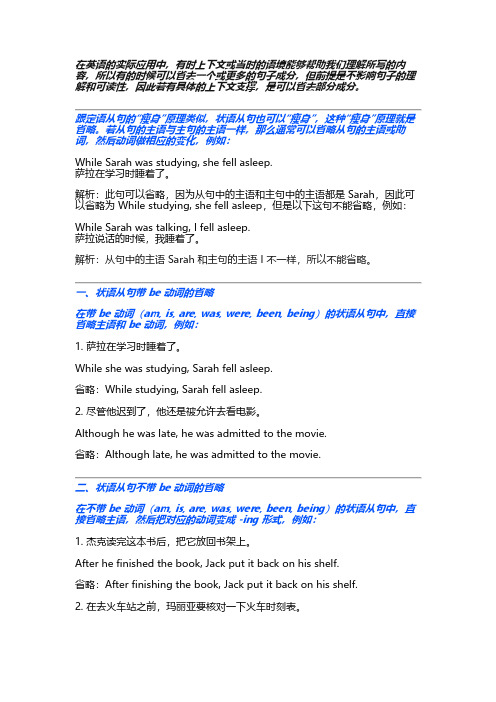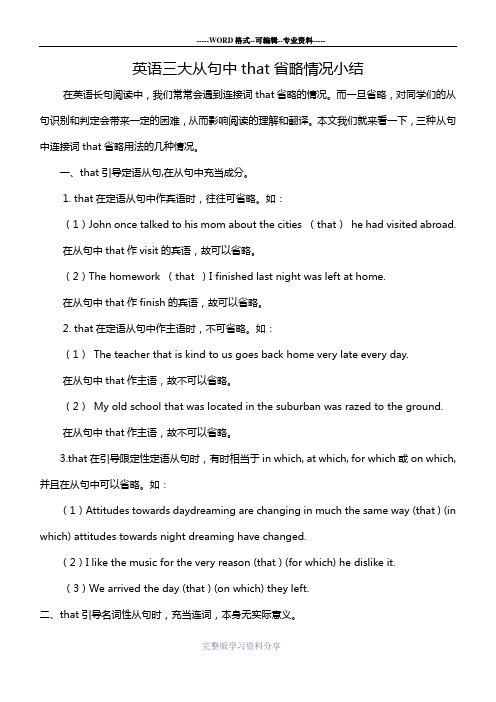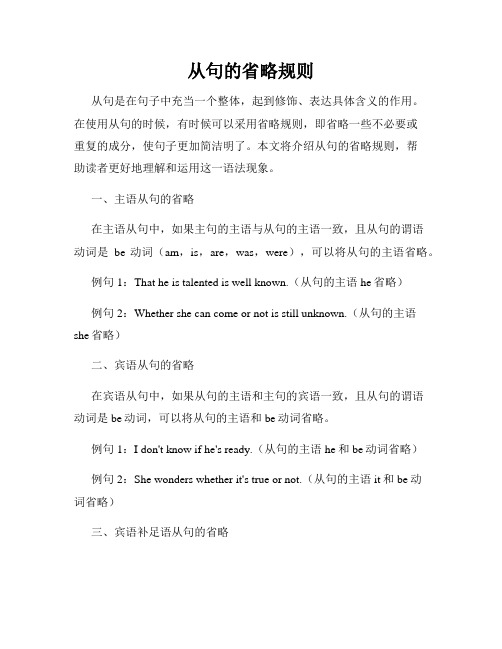定语、状语从句省略
中的定语从句和状语从句的引导词和结构的对比和运用及定语从句的位置和省略规则

中的定语从句和状语从句的引导词和结构的对比和运用及定语从句的位置和省略规则定语从句和状语从句是英语语法中常见的两种从句结构,它们在句子中分别起到修饰名词或者修饰整个句子的作用。
在使用这两种从句时,我们需要灵活运用它们的引导词和结构,同时了解定语从句的位置和省略规则。
在本文中,我们将介绍定语从句和状语从句的区别,以及它们的常见引导词和结构,以及定语从句的位置和省略规则。
一、定语从句和状语从句的区别定语从句用来修饰名词或者代词,通常紧跟在被修饰的名词或代词之后,用来进一步说明或限定其意义。
状语从句则用来修饰整个句子,起到修饰或者补充说明整个句子的作用。
二、定语从句的引导词和结构在定语从句中,我们常常使用关系代词或者关系副词来引导从句。
常见的关系代词有:that, which, who, whom, whose等;常见的关系副词有:when, where, why等。
关系代词引导的定语从句通常有两种结构:1. 主格关系代词和物主代词引导的定语从句:- 关系代词who代表人,that既可以代表人也可以代表物,whom只能代表人的宾格,whose表示所有格。
例如:The man who is standing over there is my brother.- 关系代词which代表物,that既可以代表人也可以代表物,whose表示所有格。
例如:The book which is on the table is mine.2. 宾格关系代词引导的定语从句:- 关系代词whom代表人的宾格。
例如:He invited the girl whom I met yesterday to the party.- 关系代词which代表物。
例如:I bought the car which he recommended.关系副词引导的定语从句可以表示时间、地点、原因、方式等。
例如:I still remember the day when we first met.三、状语从句的引导词和结构状语从句的引导词通常有连词和从属连词,用来引导表达时间、地点、原因、条件、目的等不同的状语从句。
英语中状语从句的省略规则

在英语的实际应用中,有时上下文或当时的语境能够帮助我们理解所写的内容,所以有的时候可以省去一个或更多的句子成分,但前提是不影响句子的理解和可读性,因此若有具体的上下文支撑,是可以省去部分成分。
跟定语从句的“瘦身”原理类似,状语从句也可以“瘦身”,这种“瘦身”原理就是省略。
若从句的主语与主句的主语一样,那么通常可以省略从句的主语或助词,然后动词做相应的变化,例如:While Sarah was studying, she fell asleep.萨拉在学习时睡着了。
解析:此句可以省略,因为从句中的主语和主句中的主语都是 Sarah,因此可以省略为 While studying, she fell asleep,但是以下这句不能省略,例如:While Sarah was talking, I fell asleep.萨拉说话的时候,我睡着了。
解析:从句中的主语 Sarah 和主句的主语 I 不一样,所以不能省略。
一、状语从句带 be 动词的省略在带 be 动词(am, is, are, was, were, been, being)的状语从句中,直接省略主语和 be 动词,例如:1. 萨拉在学习时睡着了。
While she was studying, Sarah fell asleep.省略:While studying, Sarah fell asleep.2. 尽管他迟到了,他还是被允许去看电影。
Although he was late, he was admitted to the movie.省略:Although late, he was admitted to the movie.二、状语从句不带 be 动词的省略在不带 be 动词(am, is, are, was, were, been, being)的状语从句中,直接省略主语,然后把对应的动词变成 -ing 形式,例如:1. 杰克读完这本书后,把它放回书架上。
英语中几种常用省略的用法总结

英语中几种常用省略的用法总结省略在英语语言的应用非常广泛,其中有很多常用的省略用法。
下面总结一下以往常见的一些省略形式:一、表示未表达完整的缩写1、单字缩写。
如: is,>’s; has,>’s; have,>’ve;I,>I’m; he,>he’s; she,>she’s; do,>do’s;does,>does’s; am,>am’s2、多字缩写。
如:are not,>aren’t; cannot,>can’t; do not,>don’t; will not,>won’t; have not,>haven’t; would not,>wouldn’t; could not,>couldn’t; shouldnot,>shouldn’t; it is,>it’s; that is,>that’s; there is,>there’s二、表示不完整词组的省略1、定语从句中的省略。
如:(1) All the students (who are) present here are eager to study.(2) This is the reason (why) he decided to quit his job.2、表示概念的省略。
如:(1) TV and radio (programmes).(2) To do more exercise (is beneficial to your health).三、表示句子成分的省略1、宾语的省略。
如:(1) I like to read (books).(2) He gave me an answer (to my question).2、表语的省略。
如:(1) He is a teacher (of English).(2) The weather today is (very) hot.3、主语的省略。
英语语法中的省略有哪些

英语语法中的省略有哪些英语是按照分布面积而言最流行的语言,但母语者数量是世界第三,仅次于汉语、西班牙语。
它是学习最广泛的第二语言,是近60个主权国家的官方语言或官方语言之一。
下面是店铺为大家收集的英语语法中的省略有哪些,欢迎阅读,希望大家能够喜欢。
英语语法中的省略有哪些一、并列复合句中某些相同成分的省略。
二、在when,while,if,asif,though(或although),as,until,once,whether,unless,where等连词连接的状语从句中,常省略跟主句相同的主语和be动词。
三、当见到“when(或if,where,wherever,whenever,assoonas,asfastas,than等)+possible/necessary等”时,可理解中间省略了itis(或was)。
四、有形式主语it的主语从句可省略that。
五、在限制性定语从句中可省略作宾语的关系代词whom,which,that。
六、在direction(方向),way(方式),distance(距离),time(时间),times(倍数)等后面所接的定语从句中常省略that,which,inwhich。
七、以therebe开头的句子,其主语的定语从句常可省略关联词,而therebe结构作定语从句时,省略作主语的关系代词。
八、命令句、惊叹句、部分第一人称的陈述句、部分问句和答句中省略最为常见。
九、用so,not或其它手段来省略上文或问句中的'一部分或整个句义。
小升初英语语法省略句知识点1. 省略句的定义省略是为了避免重复、突出新信息并使上下文紧密连接的一种语法修辞手段。
省略在语言中,尤其在对话中,是一种十分普遍的现象。
2.小品词的省略1)省略介词I ‘ ve studied English (for) five years. 我已学五年英语了。
2)省略连词thatI believe (that) you will succeed . 我相信你们会成功的。
英语三大从句中that省略情况小结

英语三大从句中that省略情况小结在英语长句阅读中,我们常常会遇到连接词that省略的情况。
而一旦省略,对同学们的从句识别和判定会带来一定的困难,从而影响阅读的理解和翻译。
本文我们就来看一下,三种从句中连接词that省略用法的几种情况。
一、that引导定语从句,在从句中充当成分。
1. that在定语从句中作宾语时,往往可省略。
如:(1)John once talked to his mom about the cities (that)he had visited abroad.在从句中that作visit的宾语,故可以省略。
(2)The homework (that )I finished last night was left at home.在从句中that作finish的宾语,故可以省略。
2. that在定语从句中作主语时,不可省略。
如:(1)The teacher that is kind to us goes back home very late every day.在从句中that作主语,故不可以省略。
(2)My old school that was located in the suburban was razed to the ground.在从句中that作主语,故不可以省略。
3.that在引导限定性定语从句时,有时相当于in which, at which, for which或on which, 并且在从句中可以省略。
如:(1)Attitudes towards daydreaming are changing in much the same way (that ) (in which) attitudes towards night dreaming have changed.(2)I like the music for the very reason (that ) (for which) he dislike it.(3)We arrived the day (that ) (on which) they left.二、that引导名词性从句时,充当连词,本身无实际意义。
状语从句,定语从句、宾语从句的省略

Unit 5
First aid
:什么时候可以省略?怎么省略? 在含有状语从句的复合句中若从句的主句是it或与 主句的主语相同,且在谓语中含有be时,常省略从 句的主语和be。 1._____________________ When/While in Beijing (在北京的时候), I paid a visit to the Summer Palace. When/As a young man 当是个年轻人的时候), 2. ______________________( Abraham Lincoln was a storekeeper and a postmaster. 3. He has no money. ______ If any (要是有的话), he will give us. Unless repaired 除非修理), the machine is of no use. 4._____________( 5. _______________________( If given more attention to 要是给更多的关注), The boy could have turned out better. 6. A girl stood at the gate of the school as if _________ _____________________( talking with a teacher 跟老师讲话).
栏目 导引
Unit 5
First aid
Ⅰ 单句语法填空 ordered 1.Although ___________ (order) to stop, the driver kept on
driving as fast as he could.
从句的省略规则

从句的省略规则从句是在句子中充当一个整体,起到修饰、表达具体含义的作用。
在使用从句的时候,有时候可以采用省略规则,即省略一些不必要或重复的成分,使句子更加简洁明了。
本文将介绍从句的省略规则,帮助读者更好地理解和运用这一语法现象。
一、主语从句的省略在主语从句中,如果主句的主语与从句的主语一致,且从句的谓语动词是be动词(am,is,are,was,were),可以将从句的主语省略。
例句1:That he is talented is well known.(从句的主语he省略)例句2:Whether she can come or not is still unknown.(从句的主语she省略)二、宾语从句的省略在宾语从句中,如果从句的主语和主句的宾语一致,且从句的谓语动词是be动词,可以将从句的主语和be动词省略。
例句1:I don't know if he's ready.(从句的主语he和be动词省略)例句2:She wonders whether it's true or not.(从句的主语it和be动词省略)三、宾语补足语从句的省略在宾语补足语从句中,如果从句的主语和主句的宾语补足语一致,且从句的谓语动词是be动词,可以将从句的主语和be动词省略。
例句1:They elected him chairman, which was a wise choice.(从句的主语which和be动词省略)例句2:We made her the team captain, which turned out to be a mistake.(从句的主语which和be动词省略)四、定语从句的省略在定语从句中,当从句的主语和关系代词或关系副词引导的介词宾语一致时,可以将从句的主语和关系代词或关系副词省略。
例句1:The book I borrowed from the library is very interesting.(从句的主语I省略)例句2:The girl I saw at the party is my best friend.(从句的主语I省略)五、状语从句的省略在状语从句中,当从句的主语和主句的主语一致,且从句的谓语动词是be动词,可以将从句的主语和be动词省略。
英语中省略现象

英语中省略现象高中英语语法之省略英语中省略现象较为普遍,对省略的考查已成为高考中的热点。
句子成分的省略,可分为以下几种情况:为了使话说得简明扼要,英语句子中某个单词、短语甚至从句或主句都可以省去。
Ⅰ、状语从句中的省略用法一、如果从句的主语和主句的主语一致,且从句的谓语含有be动词的某种形式(am/is/are/was/were),可同时省略从句的主语和be动词的某种形式。
1、when,while引导的时间状语从句e.g. Do be careful when (you are) crossing the street.When/While (I was) on my way to work, I met her.2、if,unless,once引导的条件状语从句e.g. If (it is) properly treated, waste will do no harm to the environment.I’ll not go to the party unless (I am) invited.Once (you are) caught stealing in a supermarket, you will be punished.3、though,although,whether,no matter whether/what/how/who等引导的让步状语从句e.g. He was happy, though/although (he was) poor.Whether (she is) sick or well, she is always cheerful.No matter how/However hard the task (is), we must fulfill it in time.(注:从句的主语和主句的主语不一致时,只省略从句中的be动词形式)4、as if,as though引导的方式状语从句e.g. He rubbed his eyes and yawned as if/though (he was) waking up after along sleep.He stood up as if/though (he wanted) to leave.(as if/though + to do表示一个将来的动作)二、than,as引导的比较状语从句中的省略用法:当不同的主语进行比较时,一般省略从句中的谓语;当从句中的主语与谓语(be动词除外)和主句中的主语与谓语相同时,通常省略从句中的主语和谓语,只保留比较部分。
- 1、下载文档前请自行甄别文档内容的完整性,平台不提供额外的编辑、内容补充、找答案等附加服务。
- 2、"仅部分预览"的文档,不可在线预览部分如存在完整性等问题,可反馈申请退款(可完整预览的文档不适用该条件!)。
- 3、如文档侵犯您的权益,请联系客服反馈,我们会尽快为您处理(人工客服工作时间:9:00-18:30)。
定语从句省略1. 关系词充当从句的宾语的时候,可以直接省略,而从句不发生任何形式的改变。
This is the right book that you are looking for. = This is the right book you are looking for.2. 关系词充当从句的主语时,如果谓语结构为实词,将关系代词进行省略,而从句中的实词要发生形式的改变。
如果原本从句是一个主动语态,可以将动词直接变成ing形式。
如果原本谓语动词是一个被动语态,可以直接保留过去分词。
如Fruit that contains VC can relieve a cold.=Fruit containing VC can relievea cold.3.如果谓语结构为be+名词,这时,可以将be动词同时省略,将后面的名词和前面从句所修饰的名词构成同位语结构。
如I know Lucy who is the leader of the team.= I know Lucy, the leader of the team.4. 3.先行词为the way, 后面的关系代词可以是that, in which或者是不加任何关系代词。
如:I like the way you talk.5. 直接用于介词后作宾语的关系代词which不能换成that,直接用于介词后作宾语的关系代词whom不能换成who。
但若介词用于句末,则用作宾语的which, whom也可换成that, who6.(1)which用于下列情况:( I )如果引导的是非限定性定语从句; (II)关系代词充当介词的宾语,且介词位于关系代词之前;(III)先行词本身是that等。
(2)that用于下列情况:( I ) 先行词是all, everything, anything, nothing, little, much等不定代词;(II)先行词被all, any, every, no, little, much, some等词修饰;(III)先行词被序数词、形容词最高级修饰或先行词本身是序数词;(IV)先行词被the only, the very(正是、恰是),the last修饰;(V)先行词中既有人也有物;(VI)在which或who的特殊疑问句中含有定语从句等。
另外需要注意:先行词是the way,并在定语从句充当状语时,关系代词用that或省略,若用which,其前加介词in。
疑问:This was the house in which they lived last year.是否存在这种方式并正确——This was the house that they lived in last year.7.当关系词在从句中充当主语时,可以省略,后面的动词发生形式变化——主动语态时,动词变成-ING形式被动语态时,动词保留过去分词形式I know the girl who comes from BJ.I often like reading short novels which were written by Hemingway.I often like reading short novels written by Hemingway.I raise a dog which is named KING.* I raise a dog named KING.I believe the candidate who made the speech in the assembly yesterday is sure to win the support.*I believe the candidate making the speech in the assembly yesterday is sure to win the support.I know the boy who was praised by the teacher.The book which is related to the development has been published recently.They lived in a house facing the south.= They lived in a house which faced the south.The workers working in the factory are well-paid.= The workers who work in the factory are well-paid.= The workers who are working in the factory are well-paid.The tie worn by our head was made in Shanghai.= The tie which is worn by our head was made in Shanghai.The book written by Wang sells well.= The book which was written by Wang sells well.状语从句省略1. 主句和从句的主语保持一致,称为分词作状语;省略从句的主语,将后面的动词发生形式变化,主动语态变成ing形式,若是被动语态,则变为ed形式2. 如前后主语不一致,则称为独立主格结构。
省略方式:关系词(可保留)+动词形式变化(ing\-ed)。
Because mum was ill,I didn't go to school.----Mum being ill,I didn't go to school.When he finished his homework,we went out to play.—-He finishing his homework,we went out to play.一、时间状语从句中的省略When (she was) very young, she began to learn to play the piano. 她很小时,就开始学习弹钢琴。
While (I was) at college, I began to know him, a strange but able student. 我在上大学时就开始认识他,一个奇怪但有能力的学生。
When arriving, send me a telegram. (When you arrive, send me a telegram.) 到达之后,来个电报。
Before leaving, turn off all the lights. (Before you leave, turn off all the lights.) 走之前,请关闭所有的灯。
Don’t come in until (you are) asked to.不叫你请你不要进来。
Whenever (it is )possible, you should come and help. 不管什么时候只要有可能就来帮忙。
You should let us know the result as soon as(it is) possible. 你应尽快让我们知道结果。
注:as在引导时间状语从句时,没有这种省略现象。
我们不可说As walking, she found a nice shining thing on the ground.二、地点状语从句中的省略地点状语从句的省略常用下列结构:where(ver) possible, where(ver) necessary,Lay these books where possible you can find them easily. 把这些书放在你可能容易找到的地方。
Put in articles wherever necessary in the following passages. 在下列文章中需要的地方填入冠词。
三、条件状语从句中的省略常用的句型是:if necessary, if possible, if true, if anyone等。
如:Send the goods now if (they are) ready. 货物如果准备好了,请送过来。
He will come if (he is) asked. 如果叫他来,他就来。
If (it is) necessary, ring me at home. 如果有可能,朝我家里打电话。
Come along with me if (it is) possible. 如果有可能和我一起去吧.。
If (it is) true, this will casue us a lot of trouble. 如果是真的,这会给我们带来很多麻烦。
There are few people nowadays, if (there are) any, who remember him. 很少有人能记起他。
黑夜笼罩大地,谁也看不清远处黑压压的一片是什么东西。
There being no bus, we had to walk home.由于没有公共汽车,我们只好走回家。
2. 名词(代词)+过去分词The workers worked still harder, their living conditions greatly improved.由于工人们的生活条件大大提高,他们工作得更起劲了。
He was listening attentively in class, his eyes fixed on the blackboard.他上课专心听讲,眼睛紧盯着黑板。
3. 名词(代词)+不定式在“名词/代词+动词不定式”结构中,动词不定式和它前面的名词或代词如果存在着逻辑上的主谓关系,动词不定式则用主动的形式;如果是动宾关系,则用被动形式。
The four of us agreed on a division of labor, each to translate a quarter of the book.我们四人同意分工干,每人翻译全书的四分之一。
Many trees, flowers, and grass to be planted, our newly-built school will look even more beautiful.种上许多的树、花和草后,我们新建的学校看上去将更美。
4. 名词(代词)+形容词The Trojans asleep, the Greek soldiers crept out of the hollow wooden horse.特洛伊人睡着了,于是希腊士兵从中空的木马里悄悄爬了出来。
